Analysis of Disruptive Technologies in the Hospitality Sector (EHL604)
VerifiedAdded on 2022/08/14
|9
|2224
|19
Report
AI Summary
This report examines the impact of disruptive technologies—artificial intelligence (AI), robotics, and the Internet of Things (IoT)—on the hospitality industry. It analyzes the advantages and disadvantages of these technologies, focusing on their implementation in the Australian hotel sector. The report discusses how AI, including chatbots, enhances efficiency and customer service, while also addressing data privacy concerns. Robotics is explored through examples of robotic services and the challenges associated with staff costs and guest experience. The IoT's role in creating smart spaces and personalized guest experiences is also evaluated, considering issues like security breaches. The analysis highlights the need for hospitality leaders to balance technological advancements with guest satisfaction and ethical considerations, ultimately impacting business growth and operational efficiency.
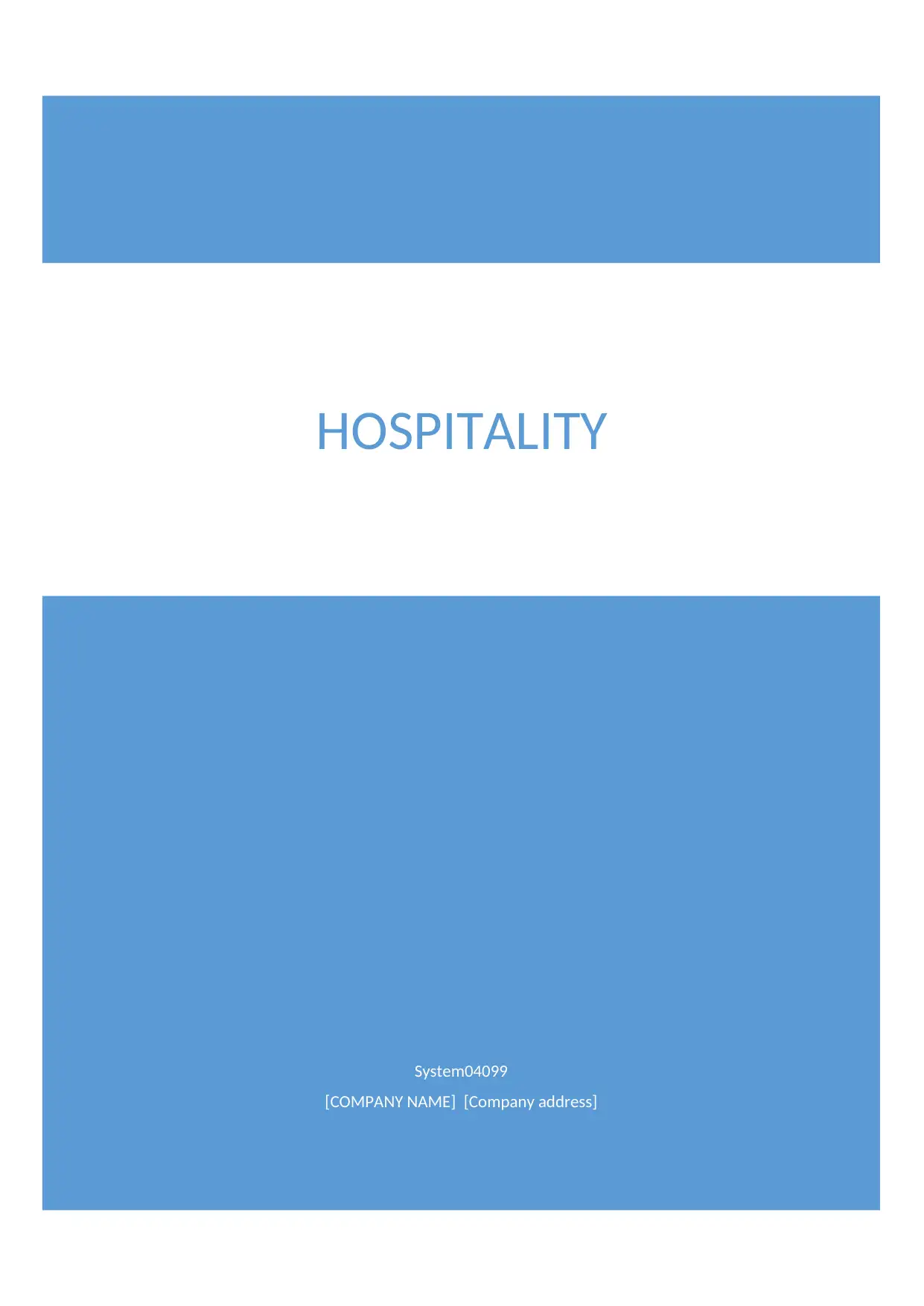
System04099
[COMPANY NAME] [Company address]
HOSPITALITY
[COMPANY NAME] [Company address]
HOSPITALITY
Paraphrase This Document
Need a fresh take? Get an instant paraphrase of this document with our AI Paraphraser

Contents
Introduction...........................................................................................................................................3
Findings and discussion.........................................................................................................................3
Conclusion.............................................................................................................................................6
References.............................................................................................................................................7
Introduction...........................................................................................................................................3
Findings and discussion.........................................................................................................................3
Conclusion.............................................................................................................................................6
References.............................................................................................................................................7
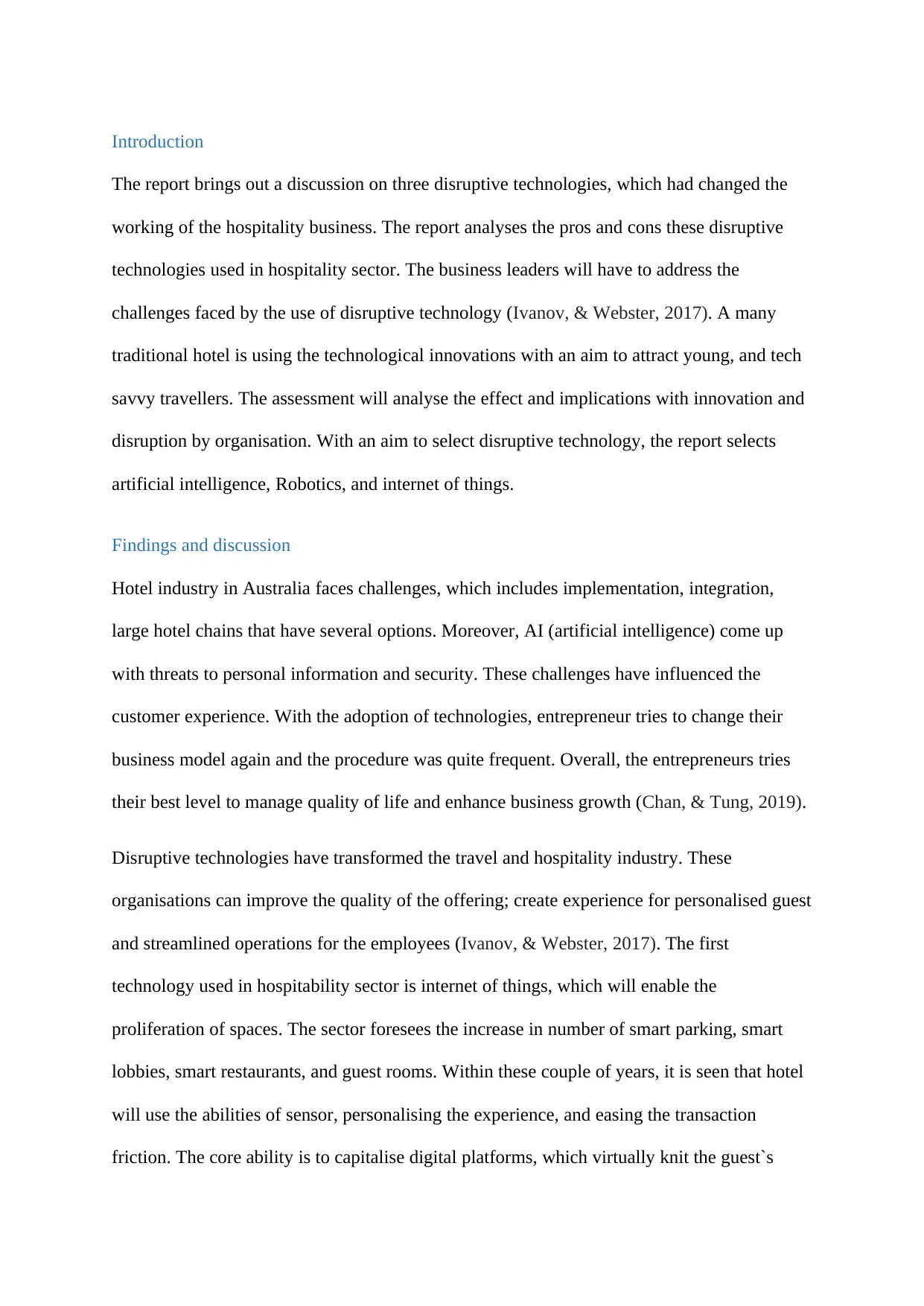
Introduction
The report brings out a discussion on three disruptive technologies, which had changed the
working of the hospitality business. The report analyses the pros and cons these disruptive
technologies used in hospitality sector. The business leaders will have to address the
challenges faced by the use of disruptive technology (Ivanov, & Webster, 2017). A many
traditional hotel is using the technological innovations with an aim to attract young, and tech
savvy travellers. The assessment will analyse the effect and implications with innovation and
disruption by organisation. With an aim to select disruptive technology, the report selects
artificial intelligence, Robotics, and internet of things.
Findings and discussion
Hotel industry in Australia faces challenges, which includes implementation, integration,
large hotel chains that have several options. Moreover, AI (artificial intelligence) come up
with threats to personal information and security. These challenges have influenced the
customer experience. With the adoption of technologies, entrepreneur tries to change their
business model again and the procedure was quite frequent. Overall, the entrepreneurs tries
their best level to manage quality of life and enhance business growth (Chan, & Tung, 2019).
Disruptive technologies have transformed the travel and hospitality industry. These
organisations can improve the quality of the offering; create experience for personalised guest
and streamlined operations for the employees (Ivanov, & Webster, 2017). The first
technology used in hospitability sector is internet of things, which will enable the
proliferation of spaces. The sector foresees the increase in number of smart parking, smart
lobbies, smart restaurants, and guest rooms. Within these couple of years, it is seen that hotel
will use the abilities of sensor, personalising the experience, and easing the transaction
friction. The core ability is to capitalise digital platforms, which virtually knit the guest`s
The report brings out a discussion on three disruptive technologies, which had changed the
working of the hospitality business. The report analyses the pros and cons these disruptive
technologies used in hospitality sector. The business leaders will have to address the
challenges faced by the use of disruptive technology (Ivanov, & Webster, 2017). A many
traditional hotel is using the technological innovations with an aim to attract young, and tech
savvy travellers. The assessment will analyse the effect and implications with innovation and
disruption by organisation. With an aim to select disruptive technology, the report selects
artificial intelligence, Robotics, and internet of things.
Findings and discussion
Hotel industry in Australia faces challenges, which includes implementation, integration,
large hotel chains that have several options. Moreover, AI (artificial intelligence) come up
with threats to personal information and security. These challenges have influenced the
customer experience. With the adoption of technologies, entrepreneur tries to change their
business model again and the procedure was quite frequent. Overall, the entrepreneurs tries
their best level to manage quality of life and enhance business growth (Chan, & Tung, 2019).
Disruptive technologies have transformed the travel and hospitality industry. These
organisations can improve the quality of the offering; create experience for personalised guest
and streamlined operations for the employees (Ivanov, & Webster, 2017). The first
technology used in hospitability sector is internet of things, which will enable the
proliferation of spaces. The sector foresees the increase in number of smart parking, smart
lobbies, smart restaurants, and guest rooms. Within these couple of years, it is seen that hotel
will use the abilities of sensor, personalising the experience, and easing the transaction
friction. The core ability is to capitalise digital platforms, which virtually knit the guest`s
⊘ This is a preview!⊘
Do you want full access?
Subscribe today to unlock all pages.

Trusted by 1+ million students worldwide
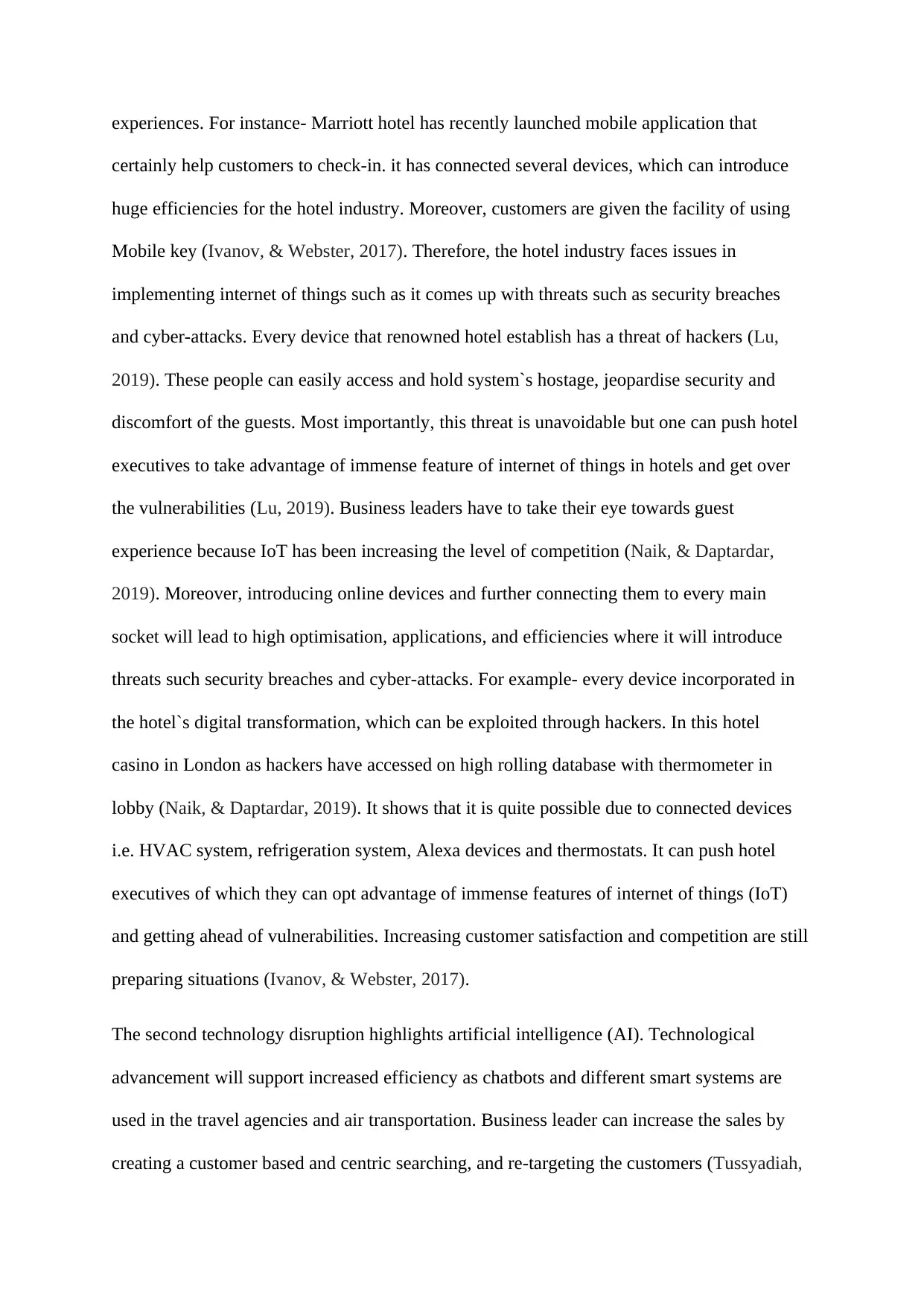
experiences. For instance- Marriott hotel has recently launched mobile application that
certainly help customers to check-in. it has connected several devices, which can introduce
huge efficiencies for the hotel industry. Moreover, customers are given the facility of using
Mobile key (Ivanov, & Webster, 2017). Therefore, the hotel industry faces issues in
implementing internet of things such as it comes up with threats such as security breaches
and cyber-attacks. Every device that renowned hotel establish has a threat of hackers (Lu,
2019). These people can easily access and hold system`s hostage, jeopardise security and
discomfort of the guests. Most importantly, this threat is unavoidable but one can push hotel
executives to take advantage of immense feature of internet of things in hotels and get over
the vulnerabilities (Lu, 2019). Business leaders have to take their eye towards guest
experience because IoT has been increasing the level of competition (Naik, & Daptardar,
2019). Moreover, introducing online devices and further connecting them to every main
socket will lead to high optimisation, applications, and efficiencies where it will introduce
threats such security breaches and cyber-attacks. For example- every device incorporated in
the hotel`s digital transformation, which can be exploited through hackers. In this hotel
casino in London as hackers have accessed on high rolling database with thermometer in
lobby (Naik, & Daptardar, 2019). It shows that it is quite possible due to connected devices
i.e. HVAC system, refrigeration system, Alexa devices and thermostats. It can push hotel
executives of which they can opt advantage of immense features of internet of things (IoT)
and getting ahead of vulnerabilities. Increasing customer satisfaction and competition are still
preparing situations (Ivanov, & Webster, 2017).
The second technology disruption highlights artificial intelligence (AI). Technological
advancement will support increased efficiency as chatbots and different smart systems are
used in the travel agencies and air transportation. Business leader can increase the sales by
creating a customer based and centric searching, and re-targeting the customers (Tussyadiah,
certainly help customers to check-in. it has connected several devices, which can introduce
huge efficiencies for the hotel industry. Moreover, customers are given the facility of using
Mobile key (Ivanov, & Webster, 2017). Therefore, the hotel industry faces issues in
implementing internet of things such as it comes up with threats such as security breaches
and cyber-attacks. Every device that renowned hotel establish has a threat of hackers (Lu,
2019). These people can easily access and hold system`s hostage, jeopardise security and
discomfort of the guests. Most importantly, this threat is unavoidable but one can push hotel
executives to take advantage of immense feature of internet of things in hotels and get over
the vulnerabilities (Lu, 2019). Business leaders have to take their eye towards guest
experience because IoT has been increasing the level of competition (Naik, & Daptardar,
2019). Moreover, introducing online devices and further connecting them to every main
socket will lead to high optimisation, applications, and efficiencies where it will introduce
threats such security breaches and cyber-attacks. For example- every device incorporated in
the hotel`s digital transformation, which can be exploited through hackers. In this hotel
casino in London as hackers have accessed on high rolling database with thermometer in
lobby (Naik, & Daptardar, 2019). It shows that it is quite possible due to connected devices
i.e. HVAC system, refrigeration system, Alexa devices and thermostats. It can push hotel
executives of which they can opt advantage of immense features of internet of things (IoT)
and getting ahead of vulnerabilities. Increasing customer satisfaction and competition are still
preparing situations (Ivanov, & Webster, 2017).
The second technology disruption highlights artificial intelligence (AI). Technological
advancement will support increased efficiency as chatbots and different smart systems are
used in the travel agencies and air transportation. Business leader can increase the sales by
creating a customer based and centric searching, and re-targeting the customers (Tussyadiah,
Paraphrase This Document
Need a fresh take? Get an instant paraphrase of this document with our AI Paraphraser
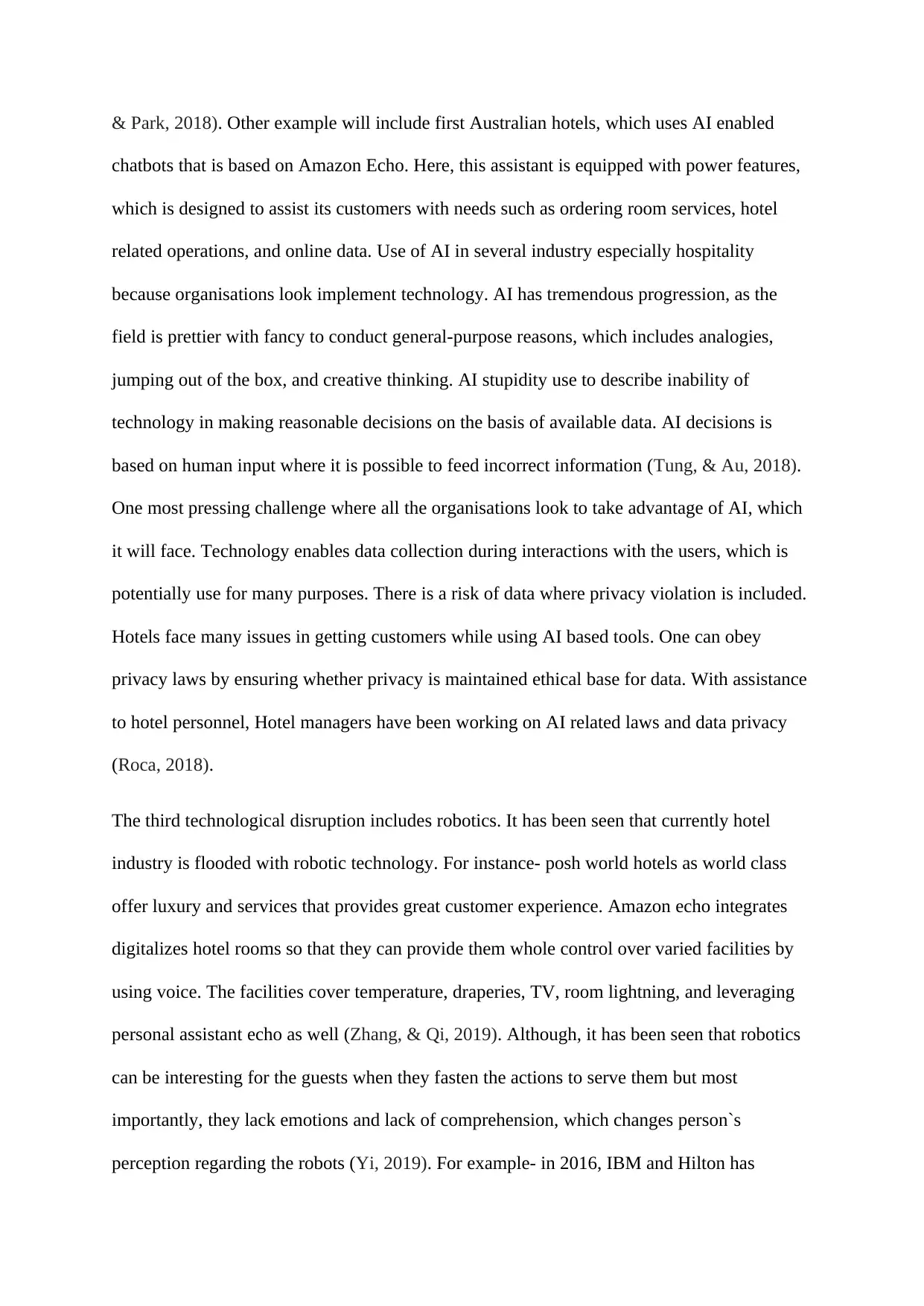
& Park, 2018). Other example will include first Australian hotels, which uses AI enabled
chatbots that is based on Amazon Echo. Here, this assistant is equipped with power features,
which is designed to assist its customers with needs such as ordering room services, hotel
related operations, and online data. Use of AI in several industry especially hospitality
because organisations look implement technology. AI has tremendous progression, as the
field is prettier with fancy to conduct general-purpose reasons, which includes analogies,
jumping out of the box, and creative thinking. AI stupidity use to describe inability of
technology in making reasonable decisions on the basis of available data. AI decisions is
based on human input where it is possible to feed incorrect information (Tung, & Au, 2018).
One most pressing challenge where all the organisations look to take advantage of AI, which
it will face. Technology enables data collection during interactions with the users, which is
potentially use for many purposes. There is a risk of data where privacy violation is included.
Hotels face many issues in getting customers while using AI based tools. One can obey
privacy laws by ensuring whether privacy is maintained ethical base for data. With assistance
to hotel personnel, Hotel managers have been working on AI related laws and data privacy
(Roca, 2018).
The third technological disruption includes robotics. It has been seen that currently hotel
industry is flooded with robotic technology. For instance- posh world hotels as world class
offer luxury and services that provides great customer experience. Amazon echo integrates
digitalizes hotel rooms so that they can provide them whole control over varied facilities by
using voice. The facilities cover temperature, draperies, TV, room lightning, and leveraging
personal assistant echo as well (Zhang, & Qi, 2019). Although, it has been seen that robotics
can be interesting for the guests when they fasten the actions to serve them but most
importantly, they lack emotions and lack of comprehension, which changes person`s
perception regarding the robots (Yi, 2019). For example- in 2016, IBM and Hilton has
chatbots that is based on Amazon Echo. Here, this assistant is equipped with power features,
which is designed to assist its customers with needs such as ordering room services, hotel
related operations, and online data. Use of AI in several industry especially hospitality
because organisations look implement technology. AI has tremendous progression, as the
field is prettier with fancy to conduct general-purpose reasons, which includes analogies,
jumping out of the box, and creative thinking. AI stupidity use to describe inability of
technology in making reasonable decisions on the basis of available data. AI decisions is
based on human input where it is possible to feed incorrect information (Tung, & Au, 2018).
One most pressing challenge where all the organisations look to take advantage of AI, which
it will face. Technology enables data collection during interactions with the users, which is
potentially use for many purposes. There is a risk of data where privacy violation is included.
Hotels face many issues in getting customers while using AI based tools. One can obey
privacy laws by ensuring whether privacy is maintained ethical base for data. With assistance
to hotel personnel, Hotel managers have been working on AI related laws and data privacy
(Roca, 2018).
The third technological disruption includes robotics. It has been seen that currently hotel
industry is flooded with robotic technology. For instance- posh world hotels as world class
offer luxury and services that provides great customer experience. Amazon echo integrates
digitalizes hotel rooms so that they can provide them whole control over varied facilities by
using voice. The facilities cover temperature, draperies, TV, room lightning, and leveraging
personal assistant echo as well (Zhang, & Qi, 2019). Although, it has been seen that robotics
can be interesting for the guests when they fasten the actions to serve them but most
importantly, they lack emotions and lack of comprehension, which changes person`s
perception regarding the robots (Yi, 2019). For example- in 2016, IBM and Hilton has
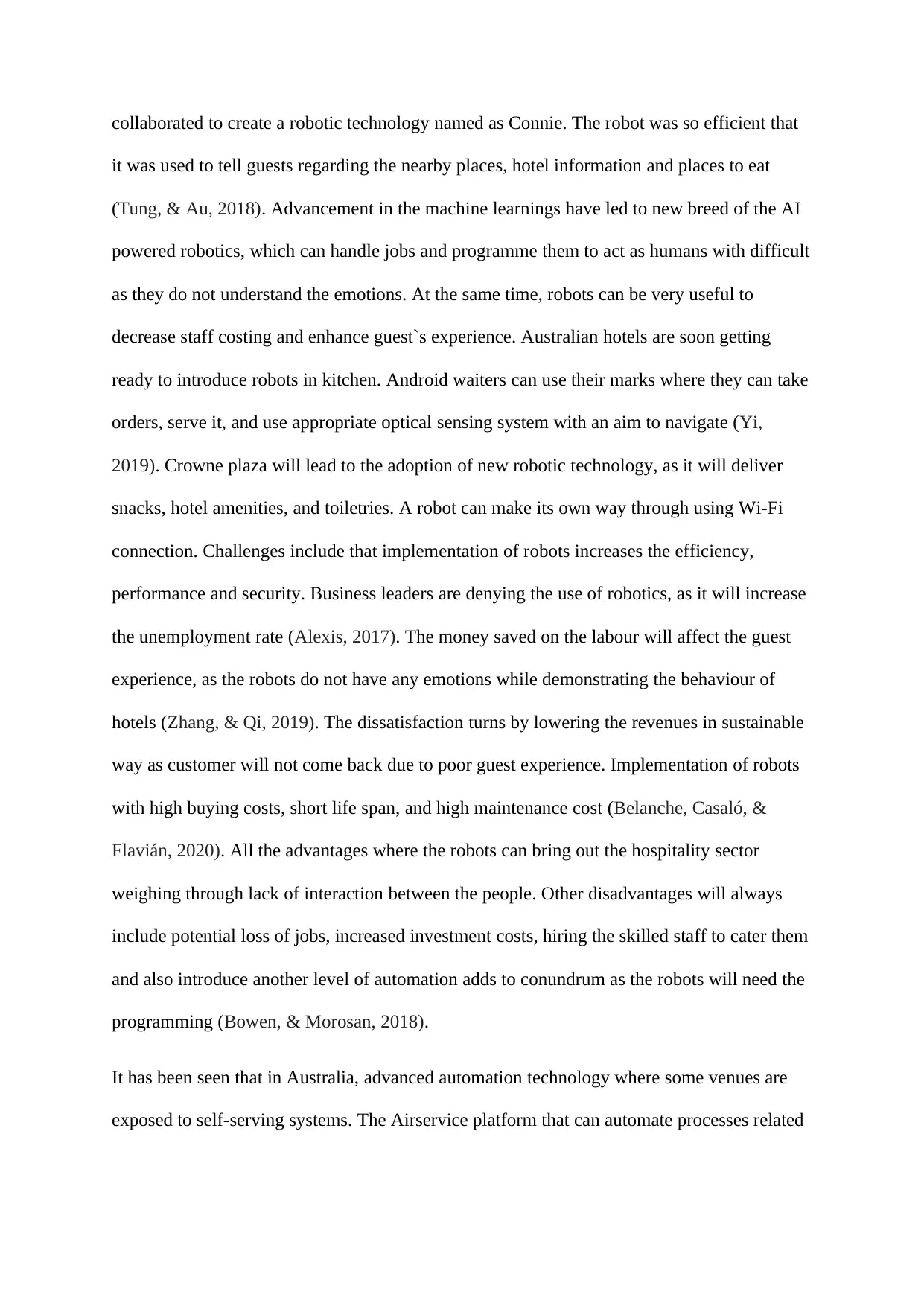
collaborated to create a robotic technology named as Connie. The robot was so efficient that
it was used to tell guests regarding the nearby places, hotel information and places to eat
(Tung, & Au, 2018). Advancement in the machine learnings have led to new breed of the AI
powered robotics, which can handle jobs and programme them to act as humans with difficult
as they do not understand the emotions. At the same time, robots can be very useful to
decrease staff costing and enhance guest`s experience. Australian hotels are soon getting
ready to introduce robots in kitchen. Android waiters can use their marks where they can take
orders, serve it, and use appropriate optical sensing system with an aim to navigate (Yi,
2019). Crowne plaza will lead to the adoption of new robotic technology, as it will deliver
snacks, hotel amenities, and toiletries. A robot can make its own way through using Wi-Fi
connection. Challenges include that implementation of robots increases the efficiency,
performance and security. Business leaders are denying the use of robotics, as it will increase
the unemployment rate (Alexis, 2017). The money saved on the labour will affect the guest
experience, as the robots do not have any emotions while demonstrating the behaviour of
hotels (Zhang, & Qi, 2019). The dissatisfaction turns by lowering the revenues in sustainable
way as customer will not come back due to poor guest experience. Implementation of robots
with high buying costs, short life span, and high maintenance cost (Belanche, Casaló, &
Flavián, 2020). All the advantages where the robots can bring out the hospitality sector
weighing through lack of interaction between the people. Other disadvantages will always
include potential loss of jobs, increased investment costs, hiring the skilled staff to cater them
and also introduce another level of automation adds to conundrum as the robots will need the
programming (Bowen, & Morosan, 2018).
It has been seen that in Australia, advanced automation technology where some venues are
exposed to self-serving systems. The Airservice platform that can automate processes related
it was used to tell guests regarding the nearby places, hotel information and places to eat
(Tung, & Au, 2018). Advancement in the machine learnings have led to new breed of the AI
powered robotics, which can handle jobs and programme them to act as humans with difficult
as they do not understand the emotions. At the same time, robots can be very useful to
decrease staff costing and enhance guest`s experience. Australian hotels are soon getting
ready to introduce robots in kitchen. Android waiters can use their marks where they can take
orders, serve it, and use appropriate optical sensing system with an aim to navigate (Yi,
2019). Crowne plaza will lead to the adoption of new robotic technology, as it will deliver
snacks, hotel amenities, and toiletries. A robot can make its own way through using Wi-Fi
connection. Challenges include that implementation of robots increases the efficiency,
performance and security. Business leaders are denying the use of robotics, as it will increase
the unemployment rate (Alexis, 2017). The money saved on the labour will affect the guest
experience, as the robots do not have any emotions while demonstrating the behaviour of
hotels (Zhang, & Qi, 2019). The dissatisfaction turns by lowering the revenues in sustainable
way as customer will not come back due to poor guest experience. Implementation of robots
with high buying costs, short life span, and high maintenance cost (Belanche, Casaló, &
Flavián, 2020). All the advantages where the robots can bring out the hospitality sector
weighing through lack of interaction between the people. Other disadvantages will always
include potential loss of jobs, increased investment costs, hiring the skilled staff to cater them
and also introduce another level of automation adds to conundrum as the robots will need the
programming (Bowen, & Morosan, 2018).
It has been seen that in Australia, advanced automation technology where some venues are
exposed to self-serving systems. The Airservice platform that can automate processes related
⊘ This is a preview!⊘
Do you want full access?
Subscribe today to unlock all pages.

Trusted by 1+ million students worldwide
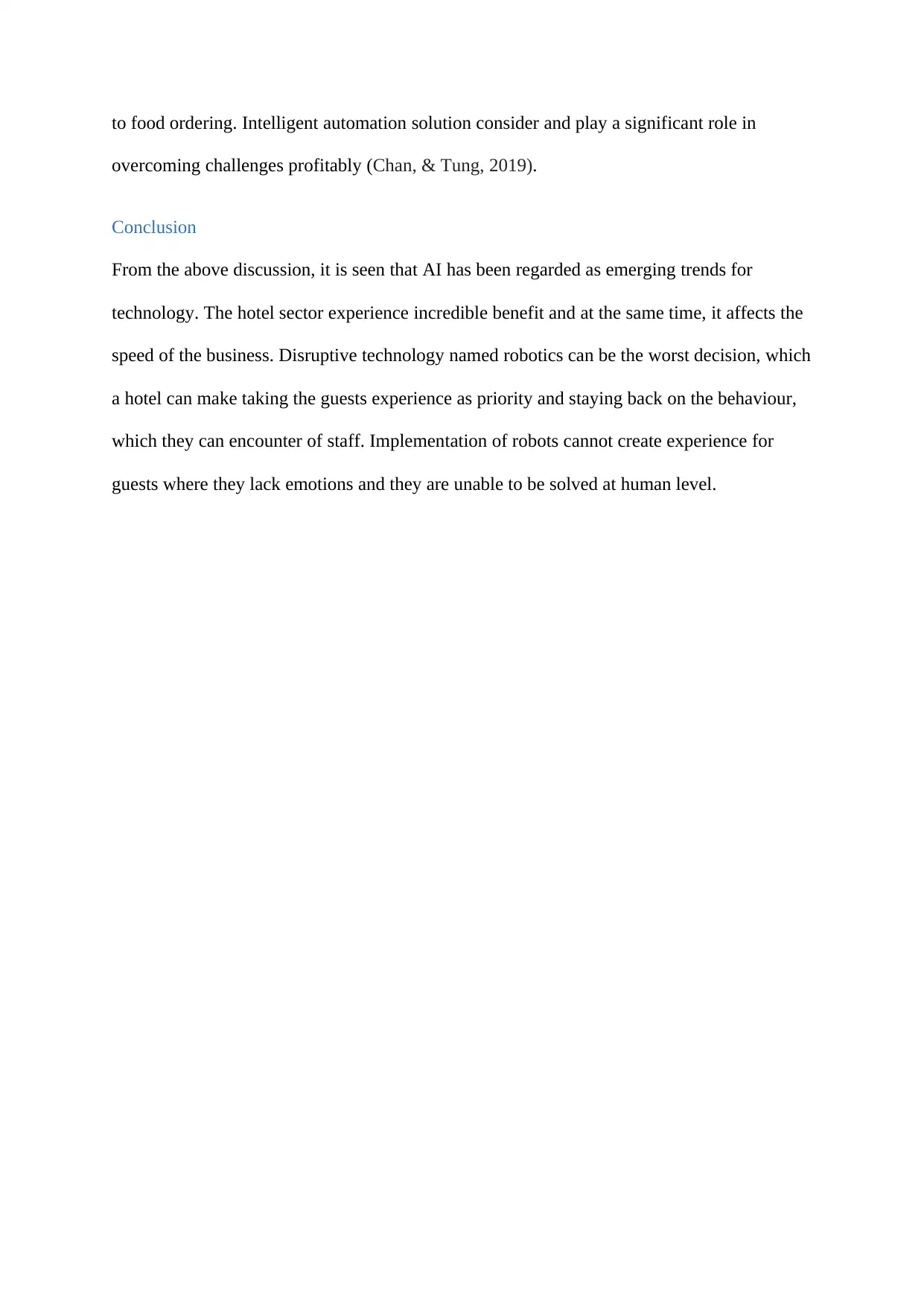
to food ordering. Intelligent automation solution consider and play a significant role in
overcoming challenges profitably (Chan, & Tung, 2019).
Conclusion
From the above discussion, it is seen that AI has been regarded as emerging trends for
technology. The hotel sector experience incredible benefit and at the same time, it affects the
speed of the business. Disruptive technology named robotics can be the worst decision, which
a hotel can make taking the guests experience as priority and staying back on the behaviour,
which they can encounter of staff. Implementation of robots cannot create experience for
guests where they lack emotions and they are unable to be solved at human level.
overcoming challenges profitably (Chan, & Tung, 2019).
Conclusion
From the above discussion, it is seen that AI has been regarded as emerging trends for
technology. The hotel sector experience incredible benefit and at the same time, it affects the
speed of the business. Disruptive technology named robotics can be the worst decision, which
a hotel can make taking the guests experience as priority and staying back on the behaviour,
which they can encounter of staff. Implementation of robots cannot create experience for
guests where they lack emotions and they are unable to be solved at human level.
Paraphrase This Document
Need a fresh take? Get an instant paraphrase of this document with our AI Paraphraser
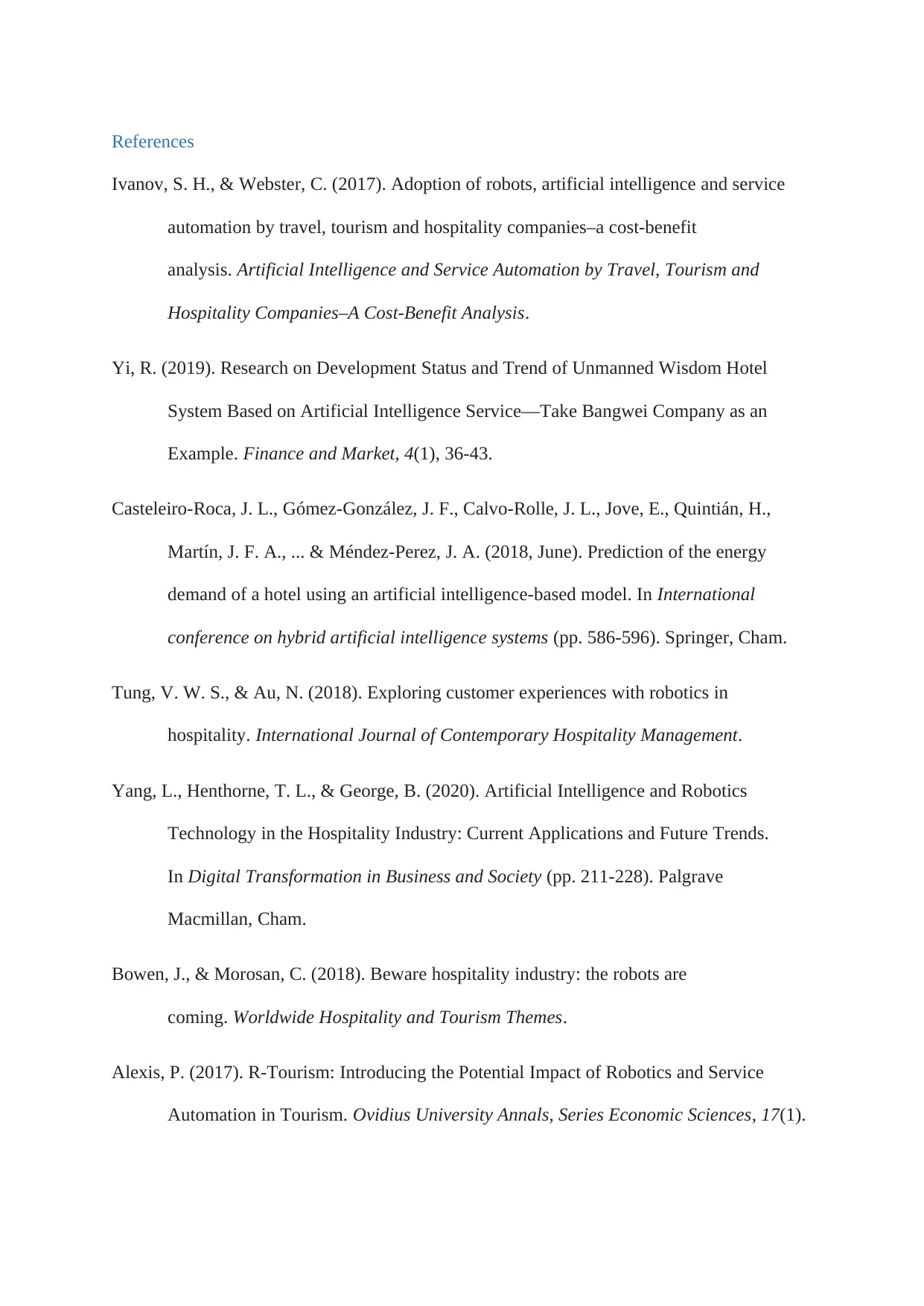
References
Ivanov, S. H., & Webster, C. (2017). Adoption of robots, artificial intelligence and service
automation by travel, tourism and hospitality companies–a cost-benefit
analysis. Artificial Intelligence and Service Automation by Travel, Tourism and
Hospitality Companies–A Cost-Benefit Analysis.
Yi, R. (2019). Research on Development Status and Trend of Unmanned Wisdom Hotel
System Based on Artificial Intelligence Service—Take Bangwei Company as an
Example. Finance and Market, 4(1), 36-43.
Casteleiro-Roca, J. L., Gómez-González, J. F., Calvo-Rolle, J. L., Jove, E., Quintián, H.,
Martín, J. F. A., ... & Méndez-Perez, J. A. (2018, June). Prediction of the energy
demand of a hotel using an artificial intelligence-based model. In International
conference on hybrid artificial intelligence systems (pp. 586-596). Springer, Cham.
Tung, V. W. S., & Au, N. (2018). Exploring customer experiences with robotics in
hospitality. International Journal of Contemporary Hospitality Management.
Yang, L., Henthorne, T. L., & George, B. (2020). Artificial Intelligence and Robotics
Technology in the Hospitality Industry: Current Applications and Future Trends.
In Digital Transformation in Business and Society (pp. 211-228). Palgrave
Macmillan, Cham.
Bowen, J., & Morosan, C. (2018). Beware hospitality industry: the robots are
coming. Worldwide Hospitality and Tourism Themes.
Alexis, P. (2017). R-Tourism: Introducing the Potential Impact of Robotics and Service
Automation in Tourism. Ovidius University Annals, Series Economic Sciences, 17(1).
Ivanov, S. H., & Webster, C. (2017). Adoption of robots, artificial intelligence and service
automation by travel, tourism and hospitality companies–a cost-benefit
analysis. Artificial Intelligence and Service Automation by Travel, Tourism and
Hospitality Companies–A Cost-Benefit Analysis.
Yi, R. (2019). Research on Development Status and Trend of Unmanned Wisdom Hotel
System Based on Artificial Intelligence Service—Take Bangwei Company as an
Example. Finance and Market, 4(1), 36-43.
Casteleiro-Roca, J. L., Gómez-González, J. F., Calvo-Rolle, J. L., Jove, E., Quintián, H.,
Martín, J. F. A., ... & Méndez-Perez, J. A. (2018, June). Prediction of the energy
demand of a hotel using an artificial intelligence-based model. In International
conference on hybrid artificial intelligence systems (pp. 586-596). Springer, Cham.
Tung, V. W. S., & Au, N. (2018). Exploring customer experiences with robotics in
hospitality. International Journal of Contemporary Hospitality Management.
Yang, L., Henthorne, T. L., & George, B. (2020). Artificial Intelligence and Robotics
Technology in the Hospitality Industry: Current Applications and Future Trends.
In Digital Transformation in Business and Society (pp. 211-228). Palgrave
Macmillan, Cham.
Bowen, J., & Morosan, C. (2018). Beware hospitality industry: the robots are
coming. Worldwide Hospitality and Tourism Themes.
Alexis, P. (2017). R-Tourism: Introducing the Potential Impact of Robotics and Service
Automation in Tourism. Ovidius University Annals, Series Economic Sciences, 17(1).
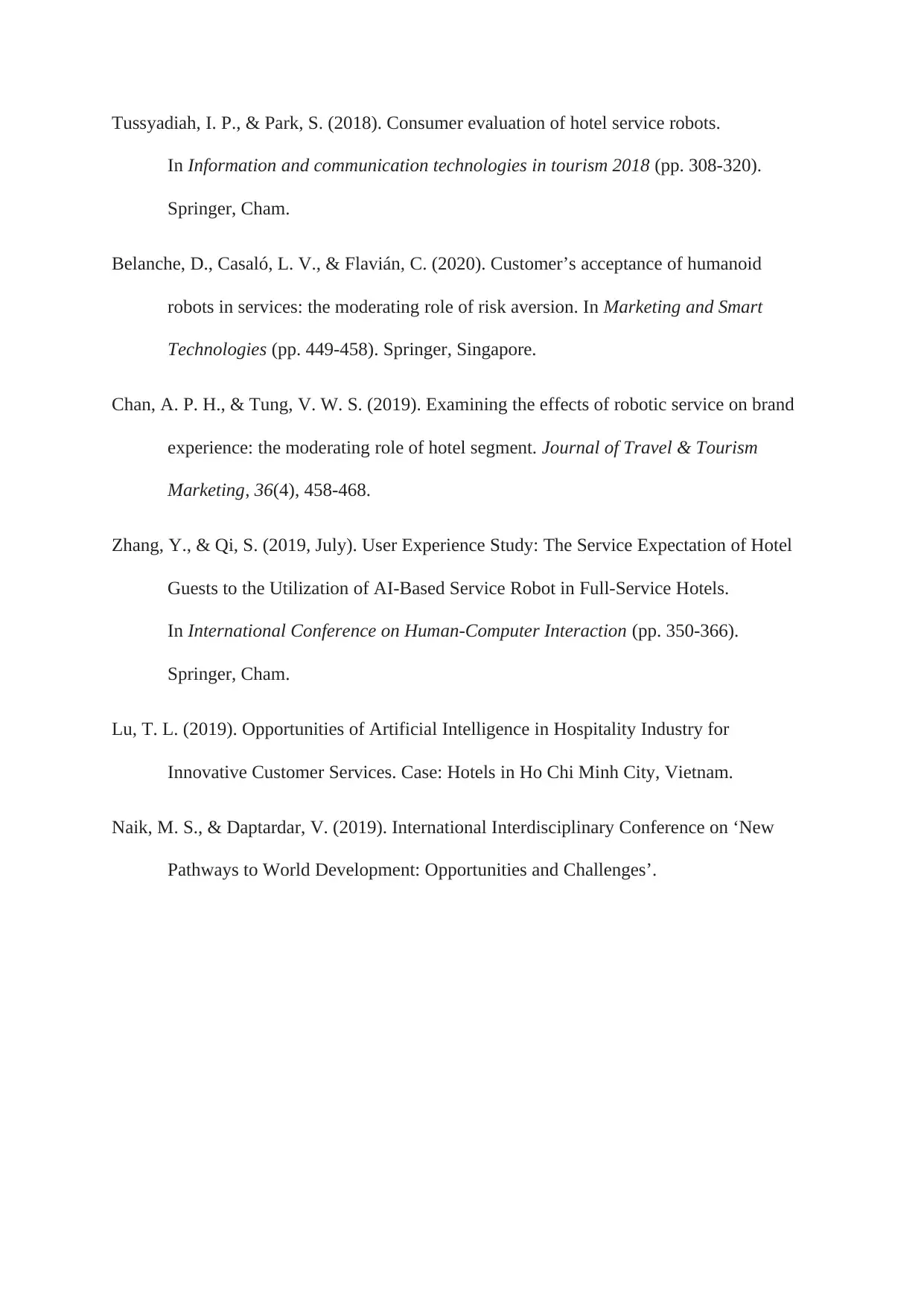
Tussyadiah, I. P., & Park, S. (2018). Consumer evaluation of hotel service robots.
In Information and communication technologies in tourism 2018 (pp. 308-320).
Springer, Cham.
Belanche, D., Casaló, L. V., & Flavián, C. (2020). Customer’s acceptance of humanoid
robots in services: the moderating role of risk aversion. In Marketing and Smart
Technologies (pp. 449-458). Springer, Singapore.
Chan, A. P. H., & Tung, V. W. S. (2019). Examining the effects of robotic service on brand
experience: the moderating role of hotel segment. Journal of Travel & Tourism
Marketing, 36(4), 458-468.
Zhang, Y., & Qi, S. (2019, July). User Experience Study: The Service Expectation of Hotel
Guests to the Utilization of AI-Based Service Robot in Full-Service Hotels.
In International Conference on Human-Computer Interaction (pp. 350-366).
Springer, Cham.
Lu, T. L. (2019). Opportunities of Artificial Intelligence in Hospitality Industry for
Innovative Customer Services. Case: Hotels in Ho Chi Minh City, Vietnam.
Naik, M. S., & Daptardar, V. (2019). International Interdisciplinary Conference on ‘New
Pathways to World Development: Opportunities and Challenges’.
In Information and communication technologies in tourism 2018 (pp. 308-320).
Springer, Cham.
Belanche, D., Casaló, L. V., & Flavián, C. (2020). Customer’s acceptance of humanoid
robots in services: the moderating role of risk aversion. In Marketing and Smart
Technologies (pp. 449-458). Springer, Singapore.
Chan, A. P. H., & Tung, V. W. S. (2019). Examining the effects of robotic service on brand
experience: the moderating role of hotel segment. Journal of Travel & Tourism
Marketing, 36(4), 458-468.
Zhang, Y., & Qi, S. (2019, July). User Experience Study: The Service Expectation of Hotel
Guests to the Utilization of AI-Based Service Robot in Full-Service Hotels.
In International Conference on Human-Computer Interaction (pp. 350-366).
Springer, Cham.
Lu, T. L. (2019). Opportunities of Artificial Intelligence in Hospitality Industry for
Innovative Customer Services. Case: Hotels in Ho Chi Minh City, Vietnam.
Naik, M. S., & Daptardar, V. (2019). International Interdisciplinary Conference on ‘New
Pathways to World Development: Opportunities and Challenges’.
⊘ This is a preview!⊘
Do you want full access?
Subscribe today to unlock all pages.

Trusted by 1+ million students worldwide
1 out of 9
Your All-in-One AI-Powered Toolkit for Academic Success.
+13062052269
info@desklib.com
Available 24*7 on WhatsApp / Email
![[object Object]](/_next/static/media/star-bottom.7253800d.svg)
Unlock your academic potential
Copyright © 2020–2026 A2Z Services. All Rights Reserved. Developed and managed by ZUCOL.

